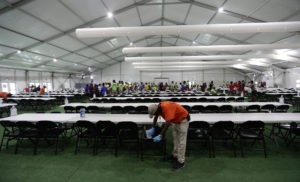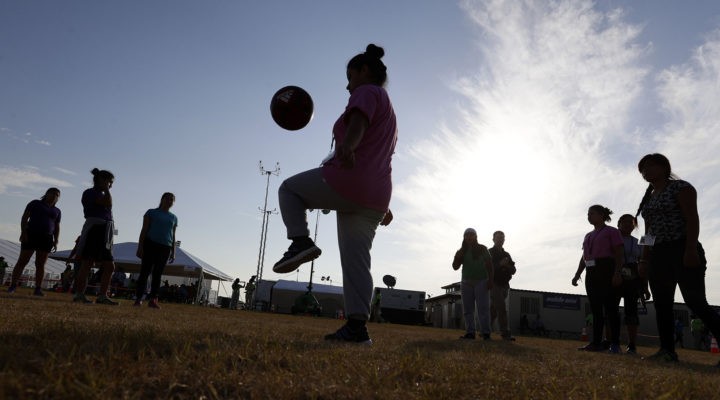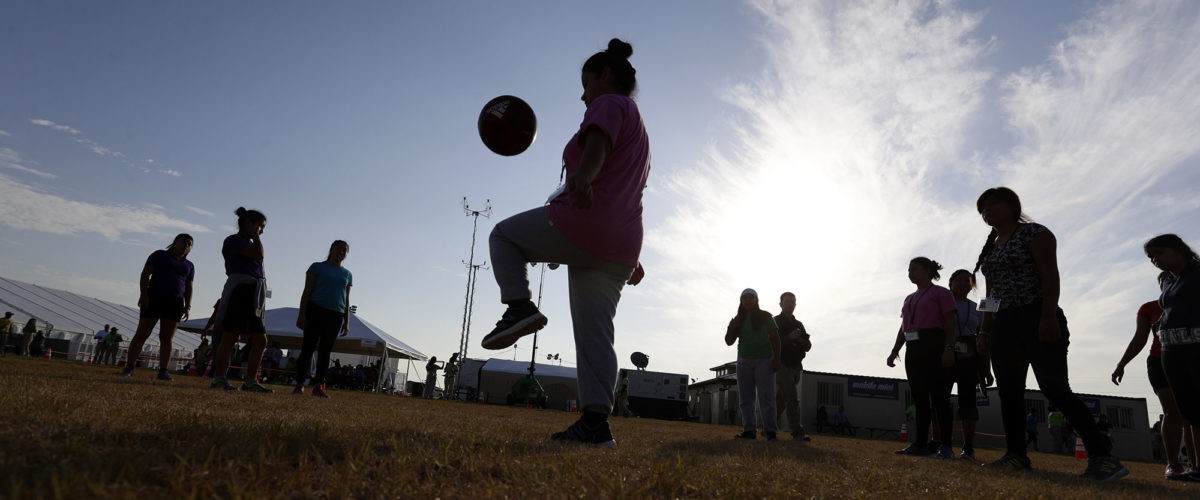A massive facility for immigrant children run by a Baptist-affiliated nonprofit has been reopened after sitting dormant for 20 months.
The Carrizo Springs Influx Care Facility in Carrizo Springs, Texas, is operated by BCFS, formerly known as Baptist Child and Family Services, based in San Antonio. BCFS has a historic connection to the Baptist General Convention of Texas and is governed by a board of directors that includes Baptist pastors and lay leaders.
According to the U.S. Department of Health and Human Services, BCFS Health and Human Services’ Emergency Management Division “operates all components of shelter operations at the facility.”
On March 15, HHS announced it had reopened the care facility on Feb. 22. It had closed in July 2020 after only one month of operation because at the time the number of unaccompanied migrant children apprehended at the U.S.-Mexico border was declining.

In this July 9, 2019, photo, a staff member cleans in a dinning hall at the U.S. government’s newest holding center for migrant children in Carrizo Springs, Texas. The government said the holding center will give it much-needed capacity to take in more children from the Border Patrol. (AP Photo/Eric Gay)
The Texas Tribune reported at the time: “The 1,300-bed facility opened June 30 to alleviate the dangerous overcrowding, prolonged detention and filthy conditions at some Border Patrol facilities where children were being held because there was not enough space for them in permanent shelters.”
When the new shelter opened in summer 2020, it was hailed by BCFS President Kevin Dinnin as a vast improvement over a previous “tent city” at Tornillo, Texas, that had been shut down in January 2020 due to complaints about overcrowding and difficult conditions. Originally designed for 400 beds, it had swollen to serve 3,800 children.
Although the Tornillo tent city was run by BCFS, Dinnin told the Washington Post he was among the chief critics of what was going on there.
Dinnin told reporters last year that his criticism “probably helped lead to Tornillo’s closure, and that he only agreed to run the Carrizo Springs facility on the condition that the government offer the public regular tours of the shelter and take other steps to be more transparent,” the Post reported.
By the time the new, larger facility at Carrizo Springs opened, it was “too much, too late,” Dinnin said.
Until now.
A ‘surge shelter’
The BCFS facility at Carrizo Springs is classified as a “surge shelter,” meaning it opens and closes, expands and contracts, as the need for its services change. This is due to the varied pattern of unaccompanied children coming across the border.

Kevin Dinnin
Being ready for such surges is an expensive proposition, Dinnin has told various news outlets. HHS had signed a five-year, $8.8 million lease for the 27-acre complex, and BCFS was awarded a contract for up to $308 million.
Dinnin told the Post last year that surge shelters like Carrizo Springs are expensive to run, costing $750 to $800 per child per day. The campus has multiple buildings and at its peak employs more than 700 people. And it has to be ready to activate on short notice.
What’s happening now
After emergency orders put in place due to COVID-19 severely restricted the influx of unaccompanied minors to the U.S., a new influx began streaming through beginning in January.
The Los Angeles Times reports that in January and February, border authorities “encountered more than 15,000 unaccompanied minors, an escalation of lone migrant kids coming to the border that began last year” and that these numbers “have gone up exponentially in recent weeks. The Associated Press reported that U.S. Border Patrol is holding more than 3,000 children in detention, a record high.
Once again, the influx of child migrants has tested the government’s ability to safely detain and shelter them.
Once again, the influx of child migrants has tested the government’s ability to safely detain and shelter them. Advocates report overcrowded conditions at Border Patrol facilities.
The Times sought to explain who the unaccompanied minors are and where they are coming from: “Unaccompanied minors are children who come to the United States without a parent. Many — particularly those under 14 — are guided by a smuggler or a family member other than a parent, from whom officials generally separate the children, thereby categorizing them as unaccompanied. Rarely do children under the age of 14 make the journey on their own, experts say.”
By the numbers
And while the numbers of such children might appear to be increasing, a careful analysis shows the data can be difficult to compare. The 15,000 “encounters” reported in January and February of this year is not a direct correlation to the 12,758 “apprehensions” reported in the same months in 2019. In government terminology, an apprehension is “the physical control or temporary detainment of a person who is not lawfully in the U.S. which may or may not result in an arrest.”
The factors that are driving the migration remain much the same as what occurred during both the Obama and Trump administrations.
The factors that are driving the migration remain much the same as what occurred during both the Obama and Trump administrations: Violence and political instability in Central America. What’s new is recent hurricanes and the chaos created by COVID-19.
Immigration advocates say the much-maligned policies of the Trump administration merely suppressed migration but did nothing to address its root causes. And, they add, the Biden administration’s revocation of Trump’s most unpopular policies has exposed the backlog of people still trying to escape hardship and poverty and violence in their home countries.
The Times reported that in 2019, illegal immigration spiked, “despite Trump’s strict immigration enforcement policies.” In fiscal 2019, border officials apprehended 977,000 people at the southern border — of whom an estimated 80,000 were unaccompanied minors.
“Even though the Trump administration put some pretty draconian policies into place, all its anti-immigration rhetoric — building a wall, family separation — that didn’t stop people from coming,” David Lapan, who was spokesman for the Department of Homeland Security under Trump, told the Times.
Meanwhile, the New York Times reports that 9,400 minors arrived along the border without parents in February, “a nearly threefold increase over last year at the same time, presenting the Biden administration with an urgent humanitarian challenge as it opens the door to children and gradually welcomes in families fleeing violence and poverty in Central America.”
In response, the federal government has opened additional shelters for teenagers at the primary convention center in Dallas and at a former camp for oil field workers in Midland, Texas.
“Children are arriving in groups and alone, some of them clutching phone numbers of relatives scrawled on little pieces of paper.”
The New York Times explains: “Children are arriving in groups and alone, some of them clutching phone numbers of relatives scrawled on little pieces of paper, according to two court-appointed lawyers who are monitoring conditions at facilities along the border.”
Because of the current influx the Biden administration has directed the Federal Emergency Management Agency to assist in processing and finding shelters for the migrant children.
Ministries now focusing north of the border
Because of the Trump administration’s push to restrict immigration in general and to force even asylum-seekers to remain in Mexico while awaiting court dates, many faith-based humanitarian ministries have focused their work south of the border in the past four years. Now, they are having to retool to work the northern side as well.

Marv Knox
Since 2018, Fellowship Southwest has developed and operated a ministry network along the border, from the Gulf of Mexico to the Pacific Ocean. “Because of the protocols of the previous administration, most of our ministry has been focused on the Mexican side of the border — providing food and shelter and general protection to refugees seeking asylum in the United States,” said Executive Director Marv Knox.
“Now, increasing numbers of migrants are crossing the border. They include families and individuals in three broad categories — those who have amassed along the border, waiting for the asylum process to open up, for up to two years; those who have come recently and demonstrated a credible fear for their welfare and even their lives if they return to their homelands; and those who, out of desperation, have crossed the border on their own.”
Knox said the pastors in Fellowship Southwest’s network “are continuing their ministries in Northern Mexico, because refugees remain in the region and continue to need protection from cartels, as well as food and shelter. Fellowship Southwest is continuing to help fund these ministries and to encourage the pastors, as we have for many months.”
However, “several of our pastors and partners also are providing aid to migrants released into the United States. Overall, local and federal government officials are seeking to move immigrants from the border to sponsors across the country, where they will remain as they await disposition of their cases.”
Among those working the U.S. side of the border is Pastor Carlos Navarro of Iglesia Bautista West Brownsville, who has resumed his immigrant relief shelter ministry that had closed temporarily because of the Trump administration’s policies and because of COVID-19. “The church is helping Brownsville partners provide food, clothing and travel-goodie bags to recently admitted migrants before they board buses bound for their sponsors,” Knox reported.
Other ways Fellowship Southwest partners are serving both sides of the border now include:
- Pastor Lorenzo Ortiz, whose ministry, El Buen Samaritano Migrante, continues to operate three shelters in Northern Mexico — two in Nuevo Laredo and another in Saltillo. He also is arranging transportation for migrants released in the mid-Texas border area, primarily Del Rio, to travel directly to their sponsors in several regions in the country. To help protect immigrants as they await transportation, he has opened a fourth shelter, this time in Laredo.
- Eddie and Elizabeth Bernal, lay members of Primera Iglesia Bautista in Harlingen, have launched a ministry in that city’s airport. They and other volunteers work three shifts a day to meet migrants released by immigration officials at the airport. They help the migrants understand flight schedules and boarding passes, as well as provide food and provisions for their journeys.
- Elket Rodríguez, the Fellowship Southwest and Cooperative Baptist Fellowship immigrant and refugee advocacy and ministry coordinator, and Jorge Zapata, associate coordinator of CBF Texas, both of whom live in the Rio Grande Valley, are working alongside these pastors, helping them evaluate needs and ministry opportunities.
“The other pastors in our network are continuing to minister in their contexts, and all of us monitor the immigrant situation daily,” Knox said. “For example, Rosalío Sosa, pastor of Iglesia Bautista Tierra de Oro in El Paso, who operates 14 shelters in the State of Chihuahua, is ministering to immigrants who cross the border illegally and are deported back to Mexico.
“Fellowship Southwest feels blessed to work alongside and support these pastors, who embody the presence of Christ to people Jesus referred to as ‘the least.’”


